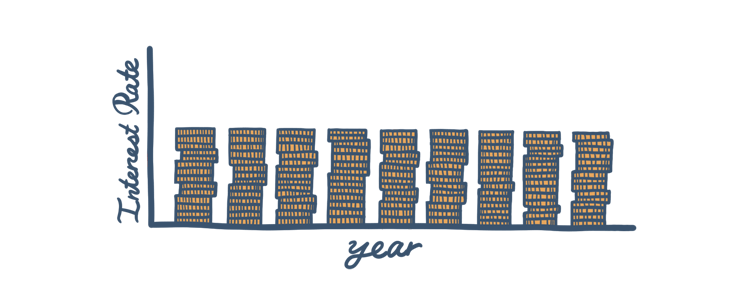Fixed Rate Mortgage

As the name would suggest, the interest rate on a fixed rate mortgage stays the same throughout the life of the loan, and consequently, so do the minimum monthly payments.
The FHA’s fixed rate mortgages are a popular option for many homebuyers as they come with the same flexible guidelines as other FHA programs, namely the 3.5% down payment requirement and 580 minimum credit score. The fixed rate mortgages have either 15 or 30-year terms. While 30-year terms are the most popular, 15-year fixed rate mortgages typically have lower interest rates with higher monthly payments, but more of the money goes toward the principal every month.
Eligibility
In order to qualify for an FHA fixed rate mortgages, it’s important you know the basic requirements:
- Your debt-to-income ratio must fall at or under the FHA’s maximum qualifying ratio of 43%.
- You must have a credit score of at least 500.
- You qualify for a 3.5% down payment if your credit score is 580 or higher, or a 10% down payment if your credit score is between 500-579.
- The house you buy must be a 1- to 4-unit structure that serves as your primary residence and meets the FHA’s minimum property requirements.
The Pros
A fixed rate loan can be a surefire choice for many borrowers because of the certainty it comes with.
- A fixed rate loan means no surprises. You know exactly what your monthly payment is going to be for the life of the loan, making it easier for you to budget your income.
- Borrowers with fixed rate mortgages are protected from the uncertainty of a fluctuating market. Even if interest rates skyrocket, your rate is locked in for the entire term.
- The fixed rates make it easier to shop around for loans, because you can simply calculate your monthly payments and make the best choice.
The Cons
The inflexibility of fixed rate mortgages may not work out for all homebuyers.
- With fixed rate loans, timing can work against you. You may feel you’re getting a low rate at closing time, but a few months down the line the rates may drop further.
- Refinancing for a lower rate may be expensive and ultimately cost you more in the long run.
- Fixed rate mortgages generally have higher interest rates than ARMs, and if you end up selling or refinancing in the first few years, your interest payments would have to be higher.

FHA Loan Articles
April 3, 2021Borrowers can choose to refinance for several reasons, but it comes down to prioritizing different benefits. One homeowner may want the lowest possible monthly payment, while another might want the shortest possible term for their loan.
March 24, 2021One of the major arguments people have for renting instead of buying is the large upfront cost of a down payment. Depending on the type of loan program you apply and are approved for, this could mean anything between 3.5% and 20% percent of your purchase price.
March 21, 2021The two basic types of home loans are fixed rate and adjustable-rate mortgages. The mortgage market offers many other options to homebuyers, but these two are the most common, and the first pair from which to pick.
March 15, 2021A key step in the mortgage process is the home appraisal. In the case of home purchase or refinance, this is a task that is almost always required by the lender, and it is important that potential homebuyers understand what, how, and why of a home appraisal.
March 10, 2021The renewable energy industry is growing more and more every year, and many homeowners have implemented energy-efficient strategies in their homes. This can include programmable thermostats, solar panels, new insulation in the attic, etc.
March 6, 2021When buying a home, you have a list of things you need to do. Get pre-approved, arrange for a home inspection, and a few other tasks. One important thing on that list is shopping for homeowner’s insurance.








